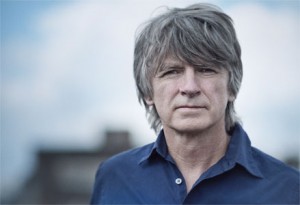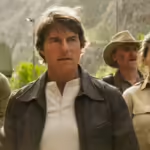Neil Finn proved himself to be a fascinating keynote speaker at BIGSOUND. Holding the audience spellbound on the opening morning, he caught up with TOM shortly afterwards. We thought we’d pin Neil down about his song writing process. Here’s the result of a quick chat to the man who has built a formidable solo career after building his ‘legend’ as a member of Split Enz and the leader of Crowded House. Sean Sennett asked the questions.
TOM: What prompted you to agree to talk at the music conference?
Neil: [I think] the difference of it and that I don’t do it very often. I was talking to Michael Leunig actually, about five years ago, about whether and when you get to your 50s or 60s or something, you should start to think about whether it’s possible you might pass on anything that you’ve learnt.
He wasn’t sure about it, and neither was I. He was starting to do a few things. He does actually turn up at things and he does stuff. I’d just been asked to do a few things, so I was going ‘well maybe I just want to be musician, play music. I don’t want to talk about it’. But it’s been brewing a bit as a thing. I get asked to do things semi regularly. Most things I say no to. I did an APRA one about two years ago, or something. Similar, question and answer thing. I quite enjoyed that. I thought that was pretty good. But also the people said BIGSOUND was really good.
TOM: It’s interesting because you’ve often said that song writing is such a mysterious process. Do you feel at these kind of things people want to talk to you about the song-writing process, or how do you conquer America, how do you get a record deal, that kind of thing?
Neil: It’s pointless asking me that, and I think they might get some answers to that amongst the collective gathering. I wouldn’t have a clue how they get a record deal in America. The way it happened for me, it’s true for me, but it’s not necessarily true for anybody else. I’m not actually that interested anyway in that process particularly. I don’t know what people are expecting or wanting to hear about. But I suspect that it’s probably, if they’re interested in the songs I’ve written and they want to have some idea of what certain pivotal things were, or trivial things were that inspired and influenced me.
Hopefully we got a few of those out from the ancient past. Then just sort of a vague idea of what the process, how I see the process of writing, as this continuous thing, as a body of work. Because it’s now that what I’m interested mostly in is continuing a body of work, right through until my last breath, if I can. It seems like it’s been valuable and it’s compulsive, and I can’t stop doing it anyway. So I just want to make sure I’m giving it the best chance of keeping that quality up, after all these years.
TOM: I was curious about your song writing process. When you were a younger guy starting out, did you just wait for inspiration to strike? I wonder now, do you still wait for that, or is it the case of turning up each day, going to your workspace, and going okay ‘where are you’?
Neil: In the old days … it’s hard to really think back. I think in some ways it’s never changed, the process. You just get a guitar in your hand, or a piano under your fingers, or these days it might be a drum kit that starts you off. But you have to start somewhere. You have to start playing, like you’re doodling on a piece of paper or something and it turns into a face. Then once you’re doing it, if you’re playing your instrument for half an hour, something’s going to catch your fancy at some point. You’ll go well, that was good. You play, and you try to remember it as you’re playing it. Or something else could happen, then I’ll go and try to do that again. And then if you record everything, like I do, sometimes you can refer back and wind it back, and go yeah, that’s right. Then you move something around. It’s a fascinating process, but it still deeply mysterious.
Nowadays I often end up getting songs out of building atmospheres, creating a sound or environment the song suddenly emerges from. As soon as I hit a four-track cassette player, that’s how I started to work, in some ways. Just to get a chord sequence. As soon as you’ve got a chord sequence, that’s kind of — there’s something in there. Put that down. And then you add a little melody… a little atmosphere. And you’re responding to what you’ve got. It’s a response mechanism, in a way for me. It allows something to live, try not to judge it too much. And then respond to it. In the response sometimes the great idea emerges, or it’s a response to that, that a great idea emerges.
TOM: Is that where the lyrics come into play? You have all your beds and your melodies kind of floating around, and then do you lock down writing lyrics?
Neil: Sometimes, and preferably the lyrics are part of that initial exploration. As soon as I’ve got a little atmosphere or set of chords or something that’s going around just a couple of minutes to listen to, like yeah, that’s got something. It’s got a feeling attached to it. Then I’ll put vocals over it. That’ll be the next process, just make shit up, basically, nonsense, and little melodies.
Then occasionally, on a good day, a line will just come out completely unconsciously, and even maybe two or three. They will spark — that line will go — we were just saying something, I go oh, yeah, okay. I was on my walk and I saw that today, so that’s what’s come out. I go ‘what else did I see’? Then what did that person say to me yesterday? I’ll throw that in. That line just comes out. But keeping it in the unconscious, subconscious, for as long as possible is always a good idea for me. I always find the more I can mine that sort of not really having to figure out or judge it, the longer it’s in that nebulous state, the better.
TOM: Do you tend to work more in the morning, afternoon, or evening?
Neil: Not exclusively any one part of the day. I’ve had successful mornings. I don’t work super late, usually, but the hours between 9 and 12 can be quite productive sometimes. But these days I just work all day, so I’m putting in far bigger hours now than I — I think I’ve had a pretty good work ethic anyway, most of the time, but particularly now there seems like urgency attached to it. I don’t know why, but it seems like I’m in there by — short of distracting days, when there’s still a few of those unfortunately, but I’m in there from 10 in the morning until 10 at night, with meals, a break every now and then to eat. I’ve pretty solid hours.
TOM: I remember interviewing you in the UK, in Bath, and I was sitting next to you. Peter Gabriel was at the buffet. Guy Chambers was at the next table. I thought if you ever need somebody to write a song for you in the hurry, we’re in a good room. When you’re working away from home, in a creative space, and there’s other creative people around, even if you’re not working with them, does that create a spark or put a zip into what you’re doing?
Neil: Oh yeah, I think so. When you are aware of good work going on somewhere else close to you, it keeps you on track — maybe that’s one of the positive things, hopefully, about an event like this for bands coming. Seeing other bands gives you a bit of hunger. Fuels your desire, both from a competitiveness — I don’t think there’s anything wrong with competition. It’s good fuel if you use it well. And just a desire to be amongst that.
I find being in New Zealand sometimes feels I’m not hooked into the networks over there, so I sometimes feel like who would really care today if I went to work or didn’t’ go to work. And I can’t sense that much else is happening out there, so why would I bother?
Every time I go to the northern hemisphere, the first few days I’m in London or in New York, and to some extent LA — although LA’s got a slightly weird vibe — you just want to work. You want to do good work because you see people working at an intense level over there.
Actually, reassuringly, you see also that they’re not working — they’re not necessarily doing better stuff than you might be doing. It’s more intense, it makes you want to really up your game, lift the ante.




